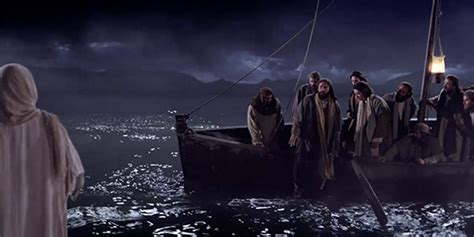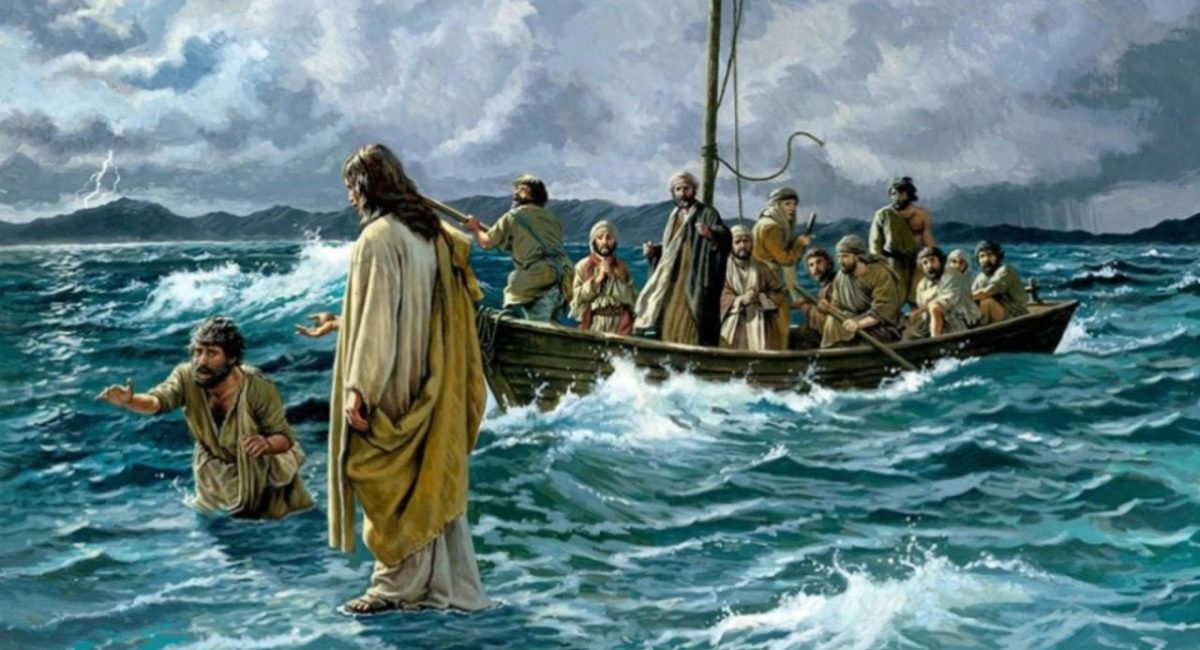Cycle A | ORDINARY TIME | WEEK 19
REFLECTION
– By Fr Ugo Ikwuka
Archway, London
A tourist visiting the Holy Land wanted to have a boat ride across the Sea of Galilee on which Jesus had walked in this Sunday’s Gospel. The boatman told him the fare was fifty dollars. The tourist exclaimed “Fifty dollars! No wonder Jesus walked!”
Following the miracle of the multiplication of the loaves and fish to feed the multitude which we read last Sunday, we read in today’s Gospel that Jesus “made” the disciples get into the boat and go to the opposite shore while he went up into the hills to pray. “Making” the disciples get into the boat suggests that they were reluctant to leave the scene of the miracle. They must have felt like members of a winning team as they enjoyed the glory that came with their man’s miracle and the admiration of the crowds.
Indeed, Jesus could easily have seized the moment to gain control of the mesmerized crowd and bring them to salvation which was his primary mission. But that will rather be taking advantage of the people. It was the sort of shortcut the Devil had offered him during his temptation: “Fall at my feet and worship me and all the kingdoms of the world will be yours.” Jesus had to turn down the offer as he resisted the temptation on this occasion; the end does not justify the means.
The disciples had to be parcelled off lest they get the wrong ideas. His power will be exercised, not through domination, control and popular appeal but through love and service. His success is measured, not in terms of crowd-pleasing miracles or supernatural powers but primarily in the quality of his relationships: with God, with people and with himself. That, too, will be the measure of our own success.
Out in the lake, the disciples battle a stormy and turbulent sea – a powerful metaphor for the church through the ages, with all of us, making our way through the world. The turbulent storm easily reflects the worldly and spiritual forces hostile to the kingdom of God that pound the church from all sides. Jesus walks up to them on the water. They feared it was a ghost. “Courage!” He tells them. “It is I!” Resonating God’s name, “I AM” (Exodus 3:14). Consequently, the wind dropped.

He is the God who can ride any storm, who transcends any forces natural and supernatural that dominates or frightens us. Very often it has looked as if the Church might sink beneath the waves but each time the Christian community has risen from the ashes stronger than before. The suppression of the faith under communist regimes and its rapid resurgence is a clear example.
Yet, that they mistook Jesus for a ghost was equally instructive. Indeed, he comes, at times in a manner in which he is easily mistaken for the enemy and well-meaning Christians try to keep him out. It is possible therefore that Jesus could be speaking through some of the voices that seemingly ‘antagonise’ the Church especially those that expose her fears and insecurities.
More pertinently however, the turbulent storm represents our fears both as individuals and as a church. The disturbing thing about our fears is that they determine and define us. If you can discern what a person is afraid of, then, you know the person. Our fears reveal our motivations, our thinking, our behavioural patterns. In fact, our fears only indirectly reveal what matters most to us. Perhaps you are afraid of losing your money, your health, your position, your good name, your family or even your life.
These are all genuine fears and we all have them. However, the problem is that our fears begin to dominate us just as our ambition could. In the midst of their fears, Jesus comes, walking on the water. In the midst of our fears whether personal, or from the external worldly or spiritual forces, Jesus comes, riding on the waves, to restore peace and harmony.
The ensuing encounter with Peter who asks that he joins Jesus on the water seems to sum up our situation in life. At his best, with eyes focused on Jesus, he could walk on water to Jesus. But then, he looks away as he begins to identify with his fears. He sinks. Don’t identify yourself with your fears but keep your gaze fixed on Christ. Hold unto him not unto your doubts.
Elijah, in the First Reading exemplifies one who, unlike us, is not defined or dominated by worldly goods. His name which means “Yahweh is God” already gives him away as one for whom God is of ultimate value. As he waited in his distress for the Lord who was to pass by his way, these worldly goods that captivate us – money, fame, health, position, good name, nationalism, family, one’s life itself – filed past alluringly in the form of whirlwind, earthquake and fire.
But Elijah could not be seduced into idolising them, into attaching ultimate value to them, into mistaking them for God. He discerned the presence of God only in the gentle breeze that came after. With ears attuned for God, the godly man Elijah is not wowed and distracted by the immediately distracting values of the world.
A man once lost his wrist watch while working in a saw mill. All the workers helped in searching for the wristwatch, upturning all the saw dust without finding it. A small boy who heard about the fruitless search slipped into the mill as the workers went on break and soon emerged with the watch. Amazed, the men asked him how he found it. “I closed the door,” the boy replied, “lay down on the sawdust and kept very still. Soon I heard the watch ticking.”
Often the question is not whether God is speaking, but whether we are attuned to hear. Secularism might be characterised as the cultural incapacity to hear the tiny whispering voice. It is the total systemic surrender to the mighty powers of the worldly goods; pleasure, money, fame, name, influence, sex, institutions, career – the earthquakes, the fires, the winds. The world needs prophetic voices like Elijah to awaken her, to call out her worship of false gods as Elijah called out Ahaz. The world needs Elijahs that are capable of discerning that tiny whispering voice, the voice of God.




